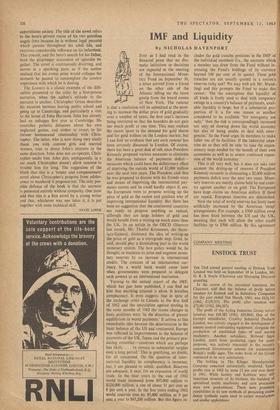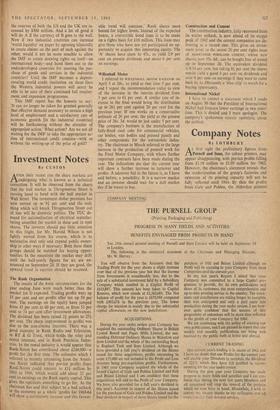IMF and Liquidity
By NICHOLAS DAVENPORT JUST as I had read in the financial press that no dra-
matic initiatives or decisions ' are expected at the meeting
of the International Mone-
tary Fund on September 30,
a letter arrived from a friend on the other side of the Atlantic telling me the latest gossip from the board rooms
of New York. The rumour is that a resolution will be submitted at the meet- ing to increase the dollar price of gold gradually over a number of years, the first year's increase being restricted so that the hoarders do not gain too much profit at one time. This may explain the recent spurt in the demand for gold shares and for gold bullion on the London market, but 1 can find no evidence that any such rumour has been seriously discussed in London. Of course, there has been a great deal of talk since President Kennedy proposed various measures to eliminate the American balance of payments deficit— measures which could have the deflationary effect of depriving the outside world of $2,000 million over the next two years. The President said that he was prepared to discuss with his friends ways and means of improving the international pay- ments system and he, could hardly object if, say, the Europeans were to propose writing up the price of gold as the easiest and quickest way of improving international liquidity. But there has been no suggestion that the continental countries are ready to propose anything so radical, although they are large holders of gold and would benefit from a writing-up much more than the UK. In an article in the OECD Observer last month, Mr. Thorkil Kristensen, the Secre- tary-General, dismissed the idea of writing-up the price of gold as a retrograde step. Gold, he said, should play a diminishing part in the world monetary system. The best policy would be, he thought, to maintain its price and augment mone- tary reserves by an increase in international credits. The creation of an international cur- rency by a world bank would come later when governments were prepared to delegate such powers to an international institution.
Turning to the annual report of the IMF, which has just been published, I can find no hint that anything unusual is afoot. It breathes complacency. It even suggests that in spite of the exchange crisis in Canada in the first half of 1962 and the speculation against sterling in the early months of 1963 the recent changes in basic positions were 'in the direction of greater equilibrium in world payments.' It arrives at this remarkable idea because the deterioration in the basic balance of the US and continental Europe was reflected in improvements in the balance of payments of the UK, Japan and the primary pro- ducing countries—`countries which are perhaps less likely . . . to remain in substantial surplus over a long period.' This is gratifying, no doubt, for all concerned. On the question of inter- national liquidity its complacency is immense, but, 1 am pleased to admit, qualified. Reserves are adequate, it says, for an expansion of world trade. In the four years to the end of 1962 world trade increased from $95,000 million to $124,000 million, a rise of about 31 per cent or 8 per cent a year. In the five years ending 1962 world reserves rose by $5,400 million or 9 per cent a year to $65,200 million. But this figure.in-
eludes the gold tranche positions in the IMF of the individual members (i.e., the amounts which a member can draw from the Fund without in- creasing the Fund's holdings of its currency beyond 100 per cent of its quota). These gold tranches are not usually quoted in a nation's reserves (why not? We may well ask Mr. Maud- ling) and this prompts the Fund to make this caveat: 'On the assumption that liquidity of all kinds is freely used to deal with temporary swings in a country's balance of payments, avail- able liquidity is large; but if a substantial pro- portion of it is for one reason or another considered to be available "for emergency use only," then the risk is correspondingly increased not only of slowing down the world economy but also of being unable to deal with emer- gencies.' So the Fund urges its members to make fuller use of its facilities. If the industrial coun- tries do so they will be able 'to take the expan- sionary steps needed for the benefit of their own economies as well as to assure continued expan- sion of the world economy.'
This is all very well, but it does not take into account the drying-up of reserves if President Kennedy succeeds in eliminating a $2,000 million payments deficit over the next two years. Mone- tary reserves are merely claims held by one coun- try against another or on gold. The Europeans have huge claims on American dollars. If these are repaid, European reserves are diminished.
Now the total of world reserves has lately been artificially increased by the American 'swap' arrangements. For example, a $500 million swap has been fixed between the US and the UK, meaning that each will allow the other credit facilities up to $500 million. By this agreement
the reserves of both the US and the UK are in- creased by $500 million. And a lot of good it will do A if the currency of B goes to the wall. Now if two industrial countries can increase 'world liquidity' on paper by agreeing bilaterally to create claims on the part of each against the other, would it not be more sensible to allow the IMF to create drawing rights on itself—an international body—and hand them out to the, underdeveloped countries for meeting the pur- chase of goods and services in the industrial countries? Until the IMF becomes a deposit- creating world credit institution on these lines the Western industrial powers will never be able to be sure of their continued full employ- ment and expansion programmes.
This IMF report has the honesty to say: 'It can no longer be taken for granted generally that effective demand necessary to sustain a high level of employment and a satisfactory rate of economic growth [in the industrial countries] will be forthcoming without the stimulus of appropriate action.' What action? Are we not all waiting for the IMF to take the appropriate ac- tion of international credit creation—with or without the writing-up of the price of gold?































 Previous page
Previous page